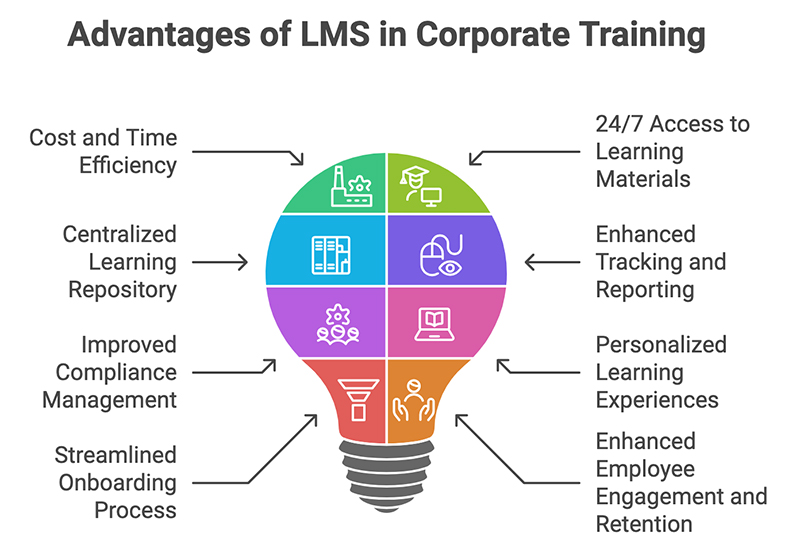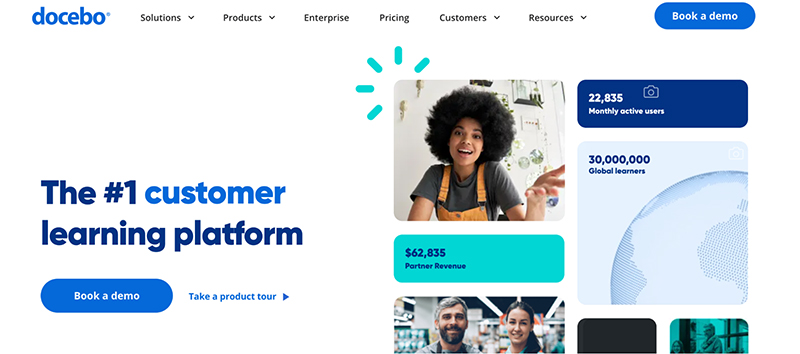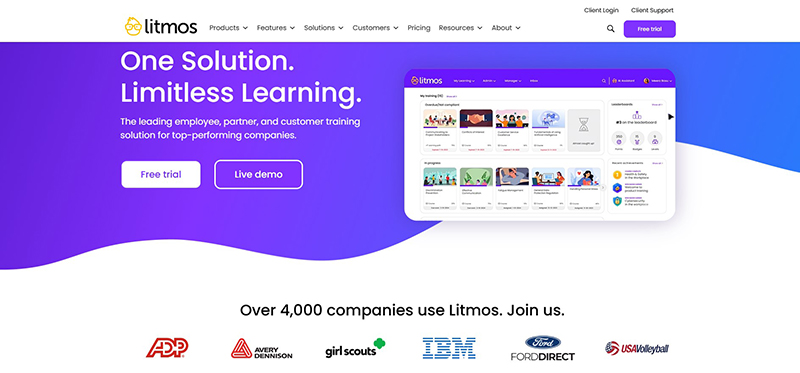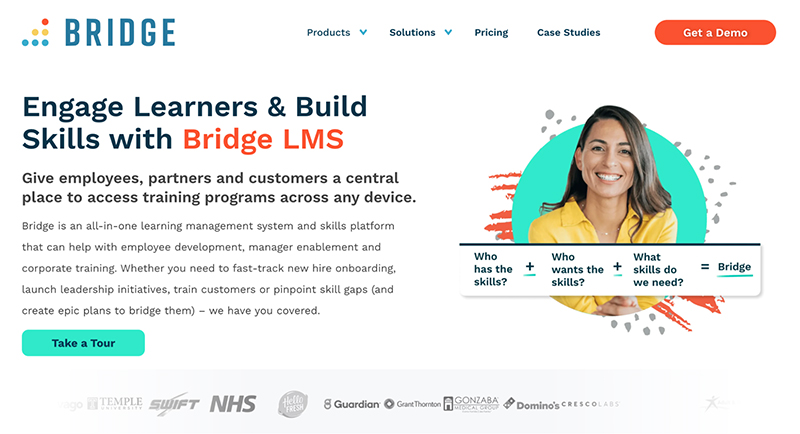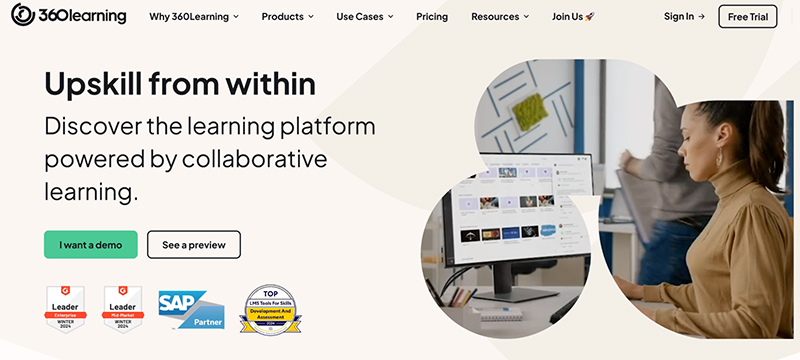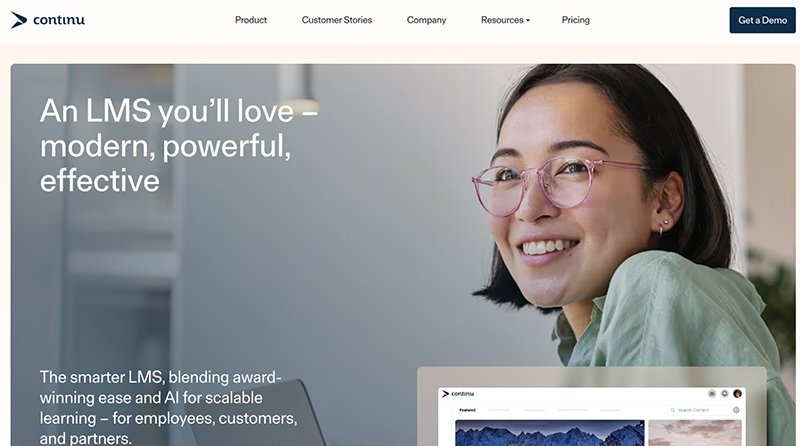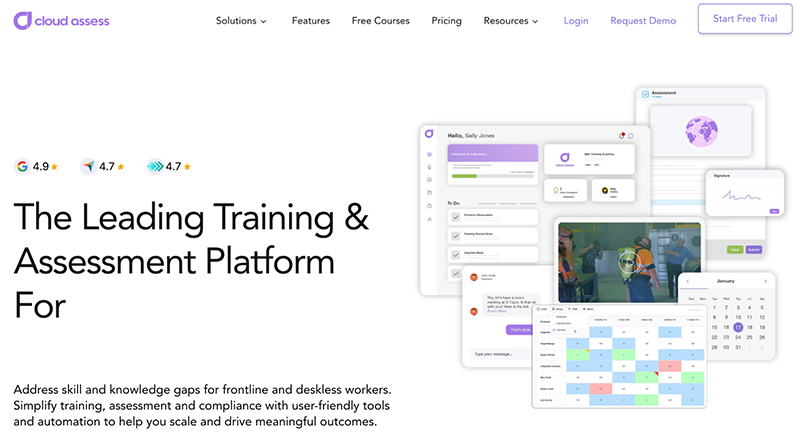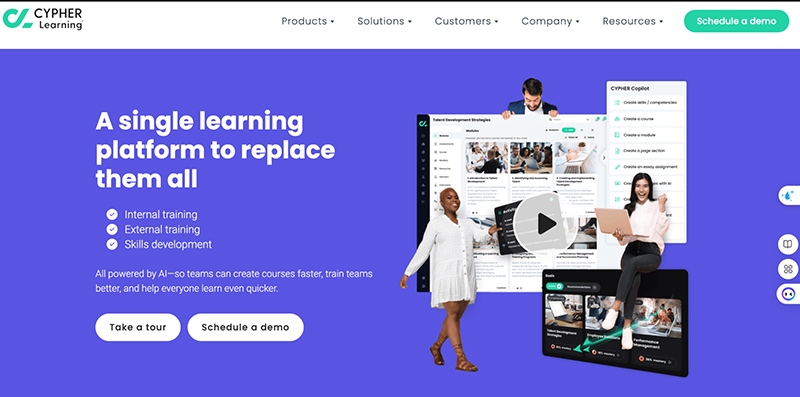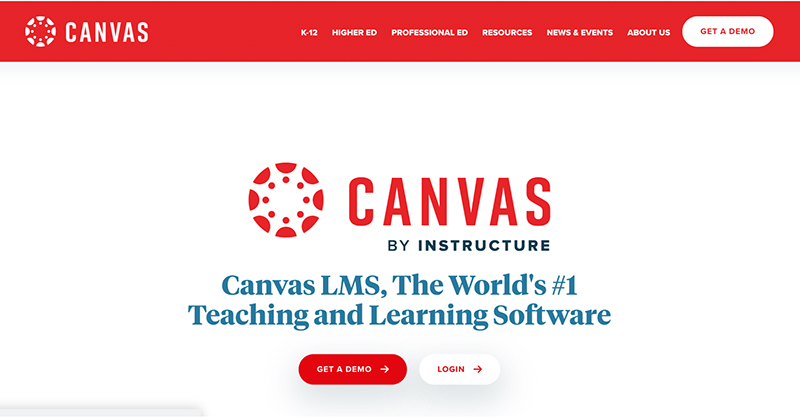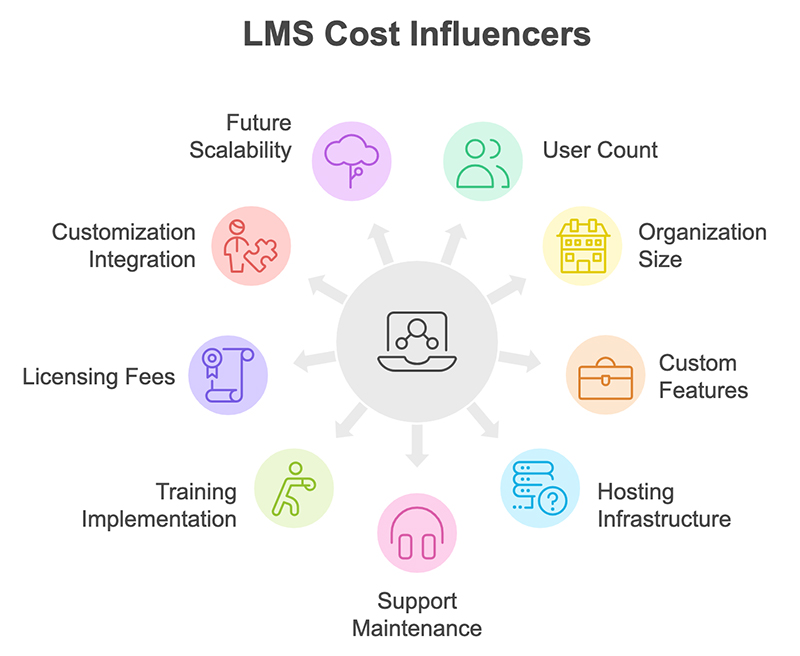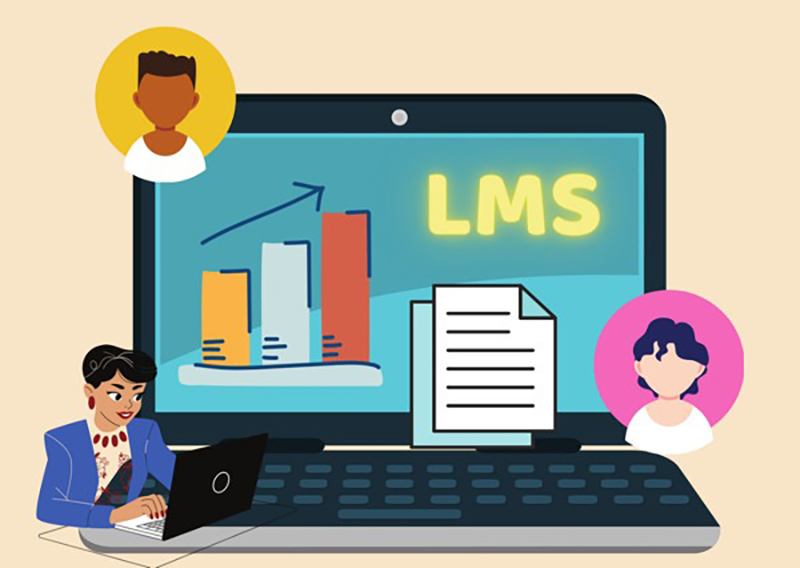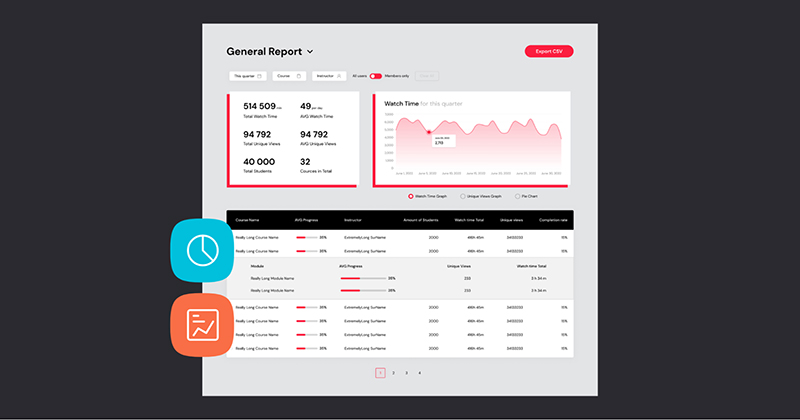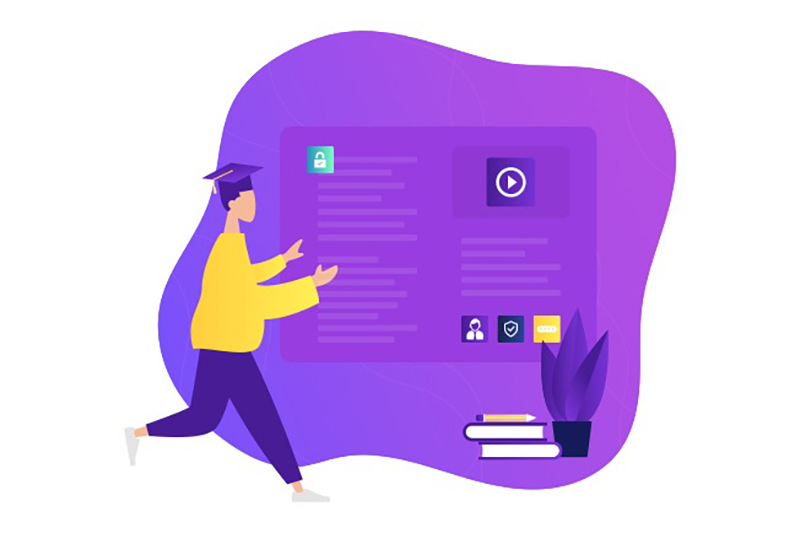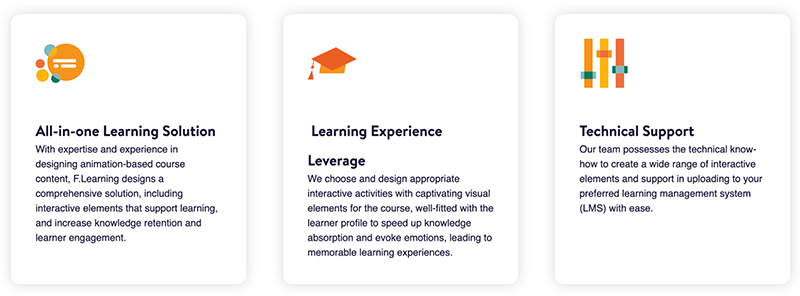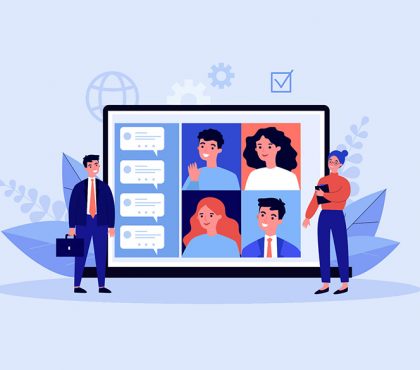With hundreds of corporate learning management systems (LMS) on the market, choosing the right one can be difficult. Each platform promises unique features, making it hard to know which truly fits your company’s needs. This guide simplifies the search by analyzing the best corporate training LMS platforms, and breaking down their strengths and weaknesses. With clear insights, you’ll have everything needed to make an informed choice.

| LMS | Overview | Key features | Pricing | Review | Integration |
| 1. Docebo 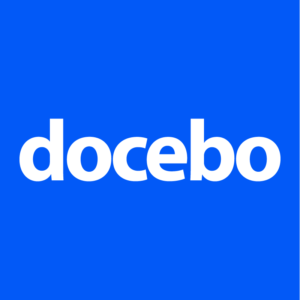 | Cloud-based LMS for formal/informal learning across industries. | AI-driven content, customizable paths, advanced analytics, e-commerce, Salesforce, and Zoom integration. | Starts at $1,600/month | User-friendly, extensive features; pricing complexity noted. | Salesforce, Zoom, MS Teams, Google Workspace |
2. Absorb LMS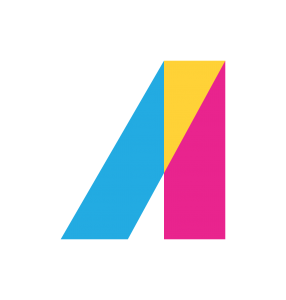 | Modern LMS for corporate training; ideal for medium-large businesses. | AI content delivery, mobile support, analytics, e-commerce, custom branding. | Available upon request | Intuitive, advanced features; limited customization options. | Salesforce, Shopify, Zoom, MS Teams |
3. SAP Litmos | Versatile LMS for compliance and onboarding; suitable for regulated industries. | Course library, mobile-friendly, gamification, compliance management, SAP integration. | Available upon request | Ease of use, comprehensive courses; lacks advanced reporting. | Entra ID, Salesforce, Zoom, ADP |
4. TalentLMS | Simple, efficient LMS for SMBs; affordable with Zoom integration. | Course authoring, assessments, branding, e-commerce, Zapier integration. | Free for 5 users; starts at $69 | Intuitive, affordable; limited advanced customization. | Zoom, Slack, Salesforce, Google Workspace |
5. Tovuti LMS | All-in-one LMS for creating, tracking online training; supports businesses of all sizes. | Course authoring, interactive content, gamification, event management. | Starts at $8/user/month | Comprehensive features, good support; some learning curve. | Zapier, Zoom, Salesforce, Google Analytics |
6. Bridge | Focused on employee development with performance management tools. | Course management, performance tools, surveys, analytics, HR integration. | Available upon request | Engaging focus; limited customization noted. | Salesforce, MS Teams, Google Workspace |
7. 360Learning | Collaborative LMS promoting peer-driven course creation; ideal for knowledge-sharing cultures. | Collaborative courses, forums, feedback, mobile access. | Starts at $8/user/month | Collaborative, easy to use; lacks advanced analytics. | Slack, Google Workspace, MS Teams |
8. Continu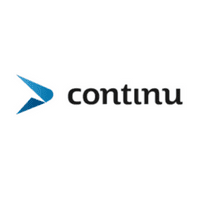 | Modern LMS for integration, engagement, lifelong learning; suitable for various training needs. | Content management, workflows, analytics, tool integration, mobile-friendly. | Available upon request | Modern interfaces; may lack intuitiveness. | Slack, Salesforce, Zoom |
9. iSpring Learn | User-friendly, integrates with PowerPoint; good for SMBs using presentation-based training. | PowerPoint integration, mobile support, reporting, e-commerce. | Starts at $2.29/user/month | Affordable, straightforward; limited customization. | PowerPoint, Google Analytics, PayPal |
10. Cloud Assess | Assessment-focused LMS ideal for compliance-heavy industries. | Flexible reporting, mobile access, customizable assessments, continuous feedback. | Starts at $50 AUD/user/month | Known for assessments; basic reporting. | Zapier, Xero, QuickBooks |
11. Cypher Learning | Flexible LMS focusing on personalized learning, ideal for ongoing professional development. | Custom courses, gamification, advanced analytics, versatile software integration. | Available upon request | Flexible, scalable; setup complexity noted. | Salesforce, Google Workspace, MS Teams, Zapier |
12. Canvas LMS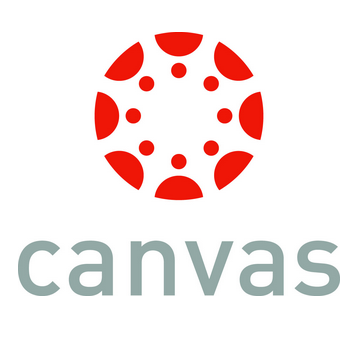 | Robust LMS used in education; effective for corporate training with strong feature set. | User-friendly interface, mobile app, extensive integration, comprehensive analytics. | Available upon request | Easy to use, many integrations; some customer support issues. | Google Workspace, MS Teams, Zoom, Slack |
- What is a Corporate Learning Management System?
- 8 Benefits of Using LMS for Corporate Training
- Best 12 Corporate LMS for Your Business
- 9 Factors Influencing the Cost of Corporate Learning Management Systems
- Key Features to Consider When Choosing the LMS for Corporate Training
- Key Trends in Corporate Learning Management Systems for 2026
- F. Learning Studio – Enhance Corporate Training with Engaging Interactive Customized Elements
- Conclusion
What is a Corporate Learning Management System?
A corporate learning management system (LMS) is a digital tool companies use to manage and track employee training. It centralizes learning materials, courses, and assessments, allowing employees to access training anytime and anywhere.
Corporate LMS platforms support different formats, like e-learning and virtual classes, making training flexible and accessible. They also provide reports on employee progress, helping managers see skill development and identify areas for improvement.
8 Benefits of Using LMS for Corporate Training
Learning management systems began as tools for schools, but it didn’t take long for businesses to see their value. With software that makes online learning easier, LMS offers clear benefits over traditional training, particularly in a landscape dominated by remote or hybrid methods.
| Benefit | Description |
| 1. Cost and time efficiency | Reduced training costs: Eliminates the need for physical materials and travel, saving costs. |
| Time savings: Allows employees to learn at their own pace, minimizing downtime. | |
| 2. 24/7 Access to Learning Materials | Flexible learning: Accessible anytime, supporting varied learning styles and schedules. |
| Self-paced learning: Enables revisiting materials for better retention. | |
| 3. Centralized learning repository | Single source of truth: Centralized storage of training resources for easy access. |
| Consistent training delivery: Ensures uniform training across the organization. | |
| 4. Enhanced tracking and reporting | Performance analytics: Monitors progress and assessment scores, offering insights. |
| Data-driven decisions: Uses data to improve training programs. | |
| 5. Improved compliance management | Regulatory compliance: Automates tracking of mandatory training and certifications. |
| Automated reminders: Sends notifications for required renewals. | |
| 6. Personalized learning experiences | Tailored content: Uses algorithms to provide individualized learning paths. |
| Adaptive learning technologies: Keeps training relevant for each learner. | |
| 7. Streamlined onboarding process | Efficient onboarding: Provides immediate access to onboarding materials for new hires. |
| Consistent orientation: Standardizes foundational training for all new employees. | |
| 8. Enhanced employee engagement and retention | Interactive learning features: Adds gamification and quizzes for motivation. |
| Career development opportunities: Promotes growth and increases satisfaction and retention. |
Best 12 Corporate LMS for Your Business
The following list of 12 corporate LMS options is a valuable resource for organizations aiming to enhance their training programs. It highlights key features, helping decision-makers choose the right platform to meet their specific needs.
1. Docebo
- Overview: Docebo is a cloud-based LMS designed to support both formal and informal learning. It is known for its robust features and flexibility, catering to various industries. It excels in managing eLearning, instructor-led training, and blended learning environments.
- Key features:
- AI-driven content recommendations
- Customizable learning paths
- Advanced reporting and analytics
- Robust e-commerce capabilities
- Integration with platforms like Salesforce and Zoom
- Pricing: Pricing starts at $1,600 per month, with plans based on active users. Custom quotes are available.
- Review: Rated highly for user-friendliness and extensive functionality, but criticized for its complex pricing structure and additional costs for enhancements
- Integration:
- Salesforce
- Zoom
- Microsoft Teams
- Google Workspace
2. Absorb LMS
- Overview: Absorb LMS offers a modern interface and comprehensive features tailored for corporate training. Ideal for medium to large businesses, Absorb LMS supports various third-party integrations, which enhances its functionality for diverse training needs across industries.
- Key features:
- AI-powered content delivery
- Mobile learning capabilities
- Comprehensive analytics
- E-commerce integration
- Custom branding options
- Pricing: Pricing available upon request.
- Review: Praised for its intuitive design and advanced features, though some users note a desire for more customization options.
- Integration:
- Salesforce
- Shopify
- Zoom
- Microsoft Teams
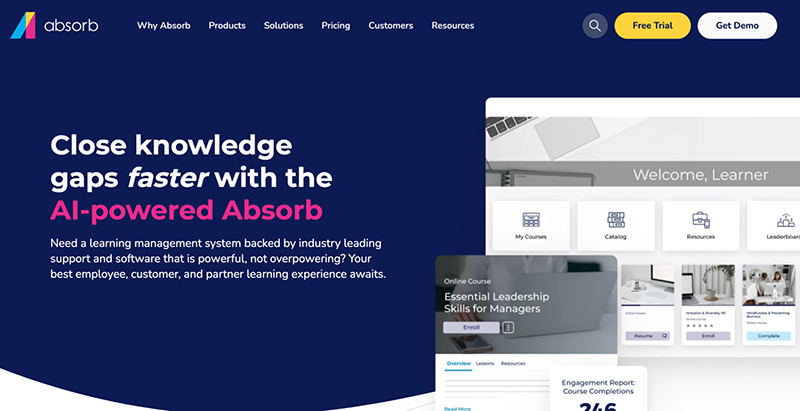
3. SAP Litmos
- Overview: SAP Litmos is a versatile LMS that supports compliance training and employee onboarding across various industries. Its pre-built course library and automated compliance tracking make it particularly suitable for organizations in regulated sectors like healthcare and finance.
- Key features:
- Extensive course library
- Mobile-friendly design
- Gamification elements
- Compliance management
- Integration with SAP and other platforms
- Pricing: Pricing is available upon request.
- Review: Users value its ease of use and comprehensive course offerings, though some mention a need for enhanced reporting features.
- Integration:
- Microsoft Entra ID (SSO)
- Salesforce
- Zoom
- ADP
4. TalentLMS
- Overview: TalentLMS is a corporate LMS focusing on simplicity and efficiency, making it ideal for small to medium-sized businesses. With affordable pricing and integration options with tools like Zoom, TalentLMS is suitable for organizations looking to implement effective training programs without extensive resources.
- Key features:
- Course authoring tools
- Assessments and surveys
- Customizable branding
- E-commerce capabilities
- Integration with various apps via Zapier
- Pricing: Free plan for up to 5 users; paid plans start at $69 per month.
- Review: Known for its intuitive interface and affordability, though some users seek more advanced customization.
- Integration:
- Zoom
- Slack
- Salesforce
- Google Workspace
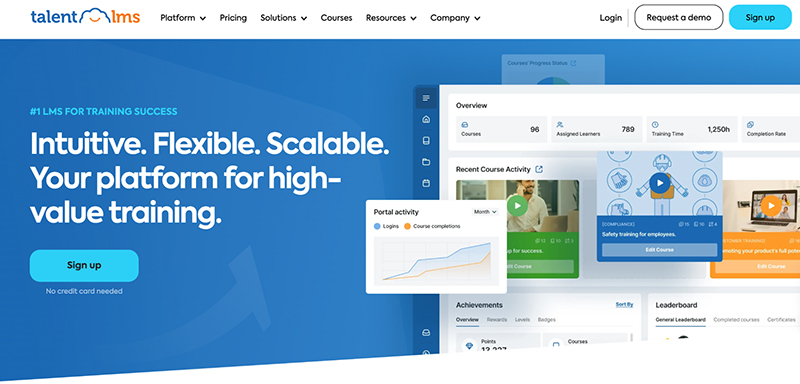
5. Tovuti LMS
- Overview: Tovuti LMS is an all-in-one cloud-based platform for corporate learning, designed to create, deliver, and track online training programs. Suitable for businesses of all sizes, Tovuti supports social learning and detailed analytics to track progress effectively.
- Key features:
- Built-in course authoring
- Interactive content creation
- Gamification and badges
- Event management
- Customizable portals
- Pricing: Starts at $8 per user per month; free trial available.
- Review: Users appreciate its comprehensive feature set and customer support, though some note a learning curve for new administrators.
- Integration:
- Zapier
- Zoom
- Salesforce
- Google Analytics
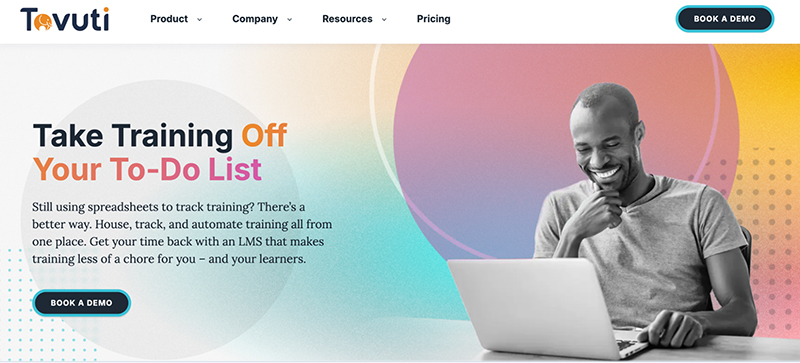
6. Bridge
- Overview: Bridge focuses on employee development through personalized learning experiences and performance management tools. It is well-suited for organizations that emphasize continuous learning and skill development within their workforce.
- Key features:
- Course creation and management
- Performance management tools
- Employee engagement surveys
- Analytics and reporting
- Integration with HR systems
- Pricing: Pricing details available upon request.
- Review: Users highlight its focus on engagement but note limitations in customization options.
- Integration:
- Salesforce
- Microsoft Teams
- Google Workspace
7. 360Learning
- Overview: 360Learning emphasizes collaborative learning by allowing users to co-create courses within the platform. This makes it particularly suitable for organizations that value knowledge sharing among employees.
- Key features:
- Collaborative course creation
- Discussion forums
- Feedback and analytics
- Integration with various tools
- Mobile accessibility
- Pricing: Starts at $8 per user per month; free trial available.
- Review: Users highlight its collaborative features and ease of use, though some mention a need for more advanced analytics.
- Integration:
- Slack
- Google Workspace
- Microsoft Teams
8. Continu
- Overview: Continu is a modern LMS designed for seamless integration and user engagement, suitable for various training needs. It is ideal for companies looking to foster a culture of lifelong learning among employees.
- Key features:
- Content creation and management
- Automated workflows
- Analytics and reporting
- Integration with existing tools
- Mobile-friendly design
- Pricing: Available upon request.
- Review: Users enjoy its modern interface but mention that it may be less intuitive than competitors.
- Integration:
- Slack
- Salesforce
- Zoom
9. iSpring Learn
- Overview: iSpring Learn is an easy-to-use LMS that integrates seamlessly with PowerPoint, which is a good choice for organizations that rely on presentation-based training materials. Its affordability and straightforward setup make it suitable for small to medium-sized businesses looking to implement effective eLearning solutions without extensive technical expertise.
- Key features:
- PowerPoint integration for easy course creation
- Mobile-friendly design
- Reporting tools
- E-commerce capabilities
- Pricing: Starts at $2.29 per user per month; free trial available.
- Review: Users find it affordable and straightforward but note limited customization options.
- Integration:
- PowerPoint
- Google Analytics
- PayPal
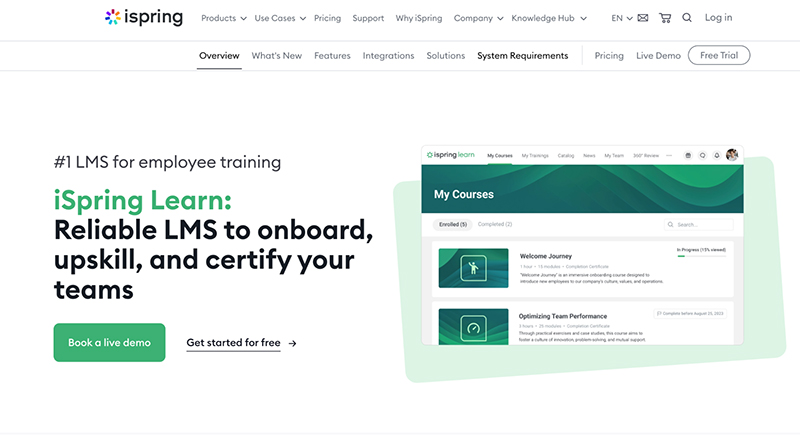
10. Cloud Assess
- Overview: Cloud Assess specializes in assessment management, making it ideal for industries requiring rigorous compliance training. Its flexible reporting tools and customizable assessments cater well to organizations focused on maintaining high standards of training effectiveness.
- Key features:
- Flexible reporting tools
- Mobile access
- Customizable assessments
- Continuous feedback mechanisms
- Pricing: Starts at $50 AUD per user per month.
- Review: Known for its assessment capabilities but has been noted as having basic reporting compared to other options.
- Integration:
- Zapier
- Xero
- QuickBooks
11. Cypher Learning
- Overview: Cypher Learning provides a versatile LMS suitable for businesses of all sizes, focusing on personalized learning experiences. It is particularly beneficial for companies that prioritize ongoing professional development.
- Key features:
- Customizable course creation
- Gamification elements
- Advanced analytics
- Integration with various software applications
- Pricing: Pricing details are available upon request.
- Review: Users appreciate its flexibility and scalability but find the initial setup process complex.
- Integration:
- Salesforce
- Google Workspace
- Microsoft Teams
- Zapier
12. Canvas LMS
- Overview: Canvas LMS is known for its robust feature set aimed primarily at educational institutions but also serves corporate training needs effectively. It offers a strong feature set for educational institutions and corporate training. Its user-friendly interface makes it easy to use for both learners and administrators.
- Key features:
- User-friendly interface
- Mobile app support
- Integration with numerous third-party applications
- Comprehensive analytics tools
- Customizable branding options
- Pricing: Pricing is available upon request; typically tailored based on institutional needs
- Review: Highly regarded for its ease of use and extensive integration capabilities, though some users report challenges with customer support.
- Integration:
- Google Workspace
- Microsoft Teams
- Zoom
- Slack
9 Factors Influencing the Cost of Corporate Learning Management Systems
The cost of implementing corporate learning management systems can vary significantly based on several factors. Understanding these factors can help organizations budget effectively and choose the right LMS for their needs.
| Cost factor | Description |
| 1. User count | Costs increase with user numbers, as many LMS platforms charge per-user or active-user fees. |
| 2. Organization size | Larger companies often require extensive LMS capabilities, such as detailed reporting and dedicated support, which can raise costs. Solutions that support large-scale, complex training programs are typically more expensive. |
| 3. Custom features and functionality | Advanced functions like gamification, in-depth analytics, and mobile access come at a premium. |
| 4. Hosting and infrastructure | Cloud-based LMS options include hosting in subscription fees, while on-premises setups need upfront investments in servers, infrastructure, and ongoing maintenance. Cloud is often preferred for scalability, while on-premises may suit organizations with robust IT support. |
| 5. Support and maintenance | Costs vary widely; some companies may need 24/7 dedicated support, while others only require email-based support. Higher support levels like dedicated account managers typically come with additional fees. |
| 6. Training and implementation costs | The initial setup includes configuring the LMS, training users, and onboarding processes. Fees can cover setup support, staff training sessions, and admin onboarding, which are vital for a smooth start without budget overruns. |
| 7. Licensing fees | Licensing structures vary. Some LMSs charge per user, while others charge per course or by usage. |
| 8. Customization and integration costs | Tailoring an LMS to specific needs or integrating with existing systems like HRIS (Human Resource Information System) or CRM (Customer Relationship Management) can incur substantial costs, as these often require additional development resources. |
| 9. Future scalability | Many corporate LMS platforms charge extra for scaling, such as adding users or features. Companies should look for flexible pricing plans that accommodate growth to keep future expansion costs manageable. |
Key Features to Consider When Choosing the LMS for Corporate Training
To choose the LMS that is the best fit for your business, it’s essential to consider several key features that can significantly impact the effectiveness and efficiency of your training programs.
1. Usability and user experience
An intuitive, easy-to-navigate LMS can make all the difference in user engagement. When learners don’t need extensive training just to get started, they’re more likely to stick around. A platform that prioritizes user experience doesn’t just improve learning retention; it encourages regular use and leads to higher course completion rates.
2. Customization and scalability
Every organization is different, and so are their educational requirements. Customization allows you to shape corporate learning management systems to fit your goals, branding, and unique requirements. But it’s not just about what works today—scalability is key.
As your organization grows, your LMS needs to evolve as well. A scalable system can keep up with more users and content without a hitch, saving you from costly upgrades down the line.
3. Integration capabilities
Your LMS shouldn’t operate in a vacuum. It needs to play well with other systems, whether it’s HR software, CRM platforms, or content repositories.
Good integration capabilities mean you’ll have seamless data flow, reducing the burden of manual tasks and giving you more insightful reporting. With an LMS that connects to your existing tools, everything just runs smoother.
4. Content creation and management tools
Corporate learning management systems should do more than just deliver content—it should make creating and managing that content a breeze. Look for features that support a range of materials, from videos to quizzes, all organized in a way that’s easy to update and adapt.
A platform that lets you keep your course catalog fresh and relevant will make a real difference in engaging learners and meeting compliance needs.
5. Reporting and analytics
To know if your training is working, you need solid reporting tools. An LMS should come with customizable dashboards to track learner progress and key performance indicators (KPIs).
With insights like these, you can make informed decisions, spot areas for improvement, and showcase the ROI of your training programs.
6. Support and training
Having reliable support when you need it can make LMS implementation and daily use a lot smoother. Look for a provider that offers robust customer support, from tutorials and webinars to dedicated account managers.
A supportive LMS partner ensures you’ll have help at every step, whether you’re troubleshooting or just getting set up.
7. Security and compliance
A good LMS should come with solid data protection protocols to keep employee information safe. Look for features like encryption, secure access controls, and regular security updates—it’s peace of mind for you and your team.
Beyond security, compliance features are essential, especially if your industry has specific certification requirements. An LMS that helps you manage certifications and stay on top of regulatory standards keeps your training program both effective and compliant.
Key Trends in Corporate Learning Management Systems for 2026
In 2026, some exciting trends are changing the world of learning management systems (LMS). Let’s check some popular trends to adapt them to your current LMS systems and stay ahead of the curve:
Generative AI and Personalization
AI is transforming every aspect of life, and corporate learning management systems are no exception. It helps LMS platforms create courses faster and personalize learning for each user. This technology also allows for competency mapping, interactive simulations, and tailored upskilling programs, ensuring that content meets individual learner needs.
With AI, companies can keep learners engaged with content that adapts based on user performance and preferences.
Immersive Learning Technologies
Virtual Reality (VR), Augmented Reality (AR), and Mixed Reality (MR) are making training more hands-on and realistic. These tools create realistic training scenarios that enhance practical skills and situational awareness.
By simulating real-world experiences, immersive learning technologies help learners retain information more effectively and apply their knowledge in practical settings.
Microlearning
Microlearning is preferred as organizations seek efficient ways to deliver training content. This approach involves short, focused learning modules that cater to modern learners’ preferences for bite-sized information.
Microlearning boosts knowledge retention and engagement by letting employees learn at their own pace. It’s especially effective in busy work environments where time is tight.
Mobile Learning
As remote and mobile work continues to grow, so does the demand for mobile-friendly corporate learning management systems. Mobile learning ensures that training is accessible to all employees, regardless of their location, thus supporting continuous learning initiatives.
Gamification
Traditional training fails to capture learners’ attention and retention. That’s when gamification comes in. It makes training fun and engaging by adding elements like points, badges, and leaderboards.
It motivates learners to participate more actively, creating a bit of friendly competition and encouraging employees to finish courses and build their skills.
If you want to add a little bit of fun and engagement to your course, F. Learning is willing to help:
F. Learning Studio – Enhance Corporate Training with Engaging Interactive Customized Elements
interested to know more?
Glad you like us! Book a consultation call with us to explore how to kick start your animation project.
A robust LMS is essential, but one that leverages interactive elements can create a standout learning experience. F. Learning offers a comprehensive solution for LMS content that prioritizes engaging, interactive elements designed specifically to support learning and maximize retention.
Our team designs visuals and activities that connect with your learners, tailored specifically to their needs. Each piece of content is carefully created to help learners absorb information faster and retain it longer. Plus, our technical team handles the setup.
From creating interactive pieces to uploading them seamlessly into your LMS, we ensure a smooth process from start to finish.
This approach combines cost-effective solutions with top-notch quality, so we ensure you get high-impact content without stretching your budget.
interested to know more?
Glad you like us! Book a consultation call with us to explore how to kick start your animation project.
Conclusion
Corporate learning management systems can be a game-changer for training—when it has the right content. Interactive, tailored visuals make all the difference in keeping learners engaged and motivated. If you want to turn your LMS into a powerful learning experience, reach out to us! F.Learning Studio is happy to help you craft animation-based learning materials that are as effective as they are engaging.
- WhatsApp: (+84) 378 713 132
- Email: [email protected]
- Fanpage: https://www.facebook.com/f.learningstudio
- LinkedIn: https://www.linkedin.com/company/f-learning-studio/

Sean Bui, the founder and creative director of F.Learning Studio, is a respected leader in the e-learning and multimedia production industry. With over 10 years of experience, he has dedicated his career to helping organizations create engaging and impactful learning experiences.
Under his leadership, F.Learning Studio has grown into a trusted partner for organizations in the education, healthcare, and corporate training sectors, producing over 2,000 minutes of educational animation.



